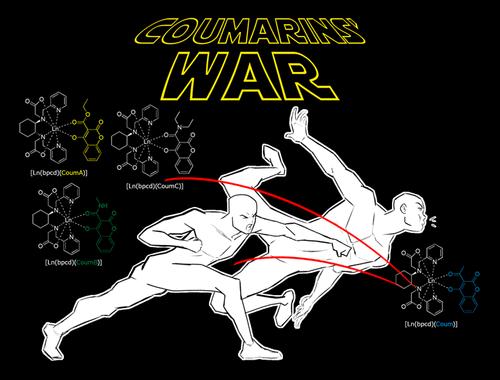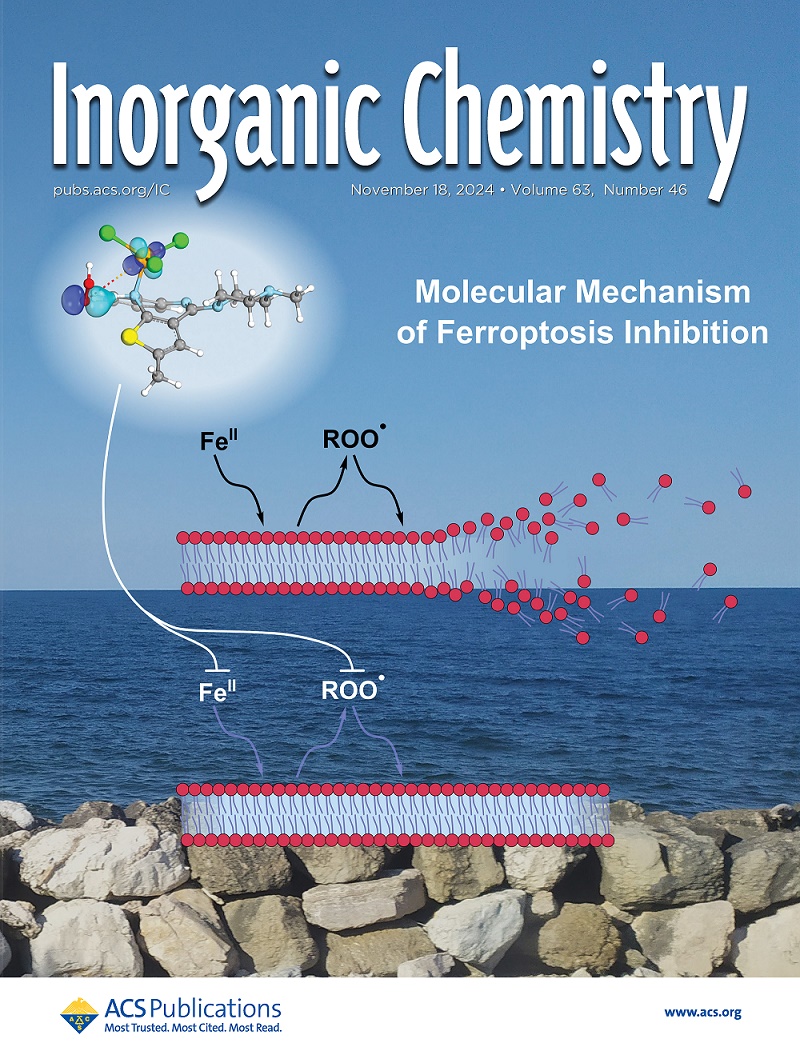Influence of Hydroxycoumarin Substituents on the Photophysical Properties of Chiroptical Tb(III) and Eu(III) Complexes
IF 4.7
2区 化学
Q1 CHEMISTRY, INORGANIC & NUCLEAR
引用次数: 0
Abstract
In this article, the synthesis, density functional theory (DFT) structural characterization, and spectroscopic investigation of chiral and heteroleptic Tb(III) and Eu(III) complexes are presented. These molecules are characterized by two different ligands: the enantiopure N,N′-bis(2-pyridylmethyl)-trans-1,2-diaminocyclohexane-N,N′-diacetic acid (H2bpcd) and a hydroxycoumarin-based ligand bearing different substituents in C(3) position (i.e., acetyl group in Coum, ethyl ester in CoumA, secondary and tertiary amides in CoumB and CoumC, respectively). The coumarin ligands exhibited different luminescence sensitization efficiency toward Tb(III) and Eu(III) ions in the related complexes of chemical formula [Ln(bpcd)(Coum)], [Ln(bpcd)(CoumA)], [Ln(bpcd)(CoumB)], [Ln(bpcd)(CoumC)]. Through theoretical calculations of intramolecular energy transfer (IET) processes (ligand-to-metal) in Eu(III) and Tb(III) complexes, along with quantum yield calculations, we provide a reasonable explanation for the observed differences in their luminescence properties. The nature of the coumarin ligand also affects the chiroptical properties of the Tb(III) complexes [i.e., circularly polarized luminescence (CPL) and electronic circular dichroism (ECD)].

羟基香豆素取代基对奇光性锑(III)和铕(III)配合物光物理性质的影响
本文介绍了手性和异性锑(III)和铕(III)配合物的合成、密度泛函理论(DFT)结构表征和光谱研究。这些分子由两种不同的配体构成:对映纯的 N,N′-双(2-吡啶基甲基)-反式-1,2-二氨基环己烷-N,N′-二乙酸(H2bpcd)和在 C(3)位上具有不同取代基的羟基香豆素配体(即 Coum, ethn、即 Coum 中的乙酰基、CoumA 中的乙酯、CoumB 和 CoumC 中的仲酰胺和叔酰胺)。在化学式为[Ln(bpcd)(Coum)]、[Ln(bpcd)(CoumA)]、[Ln(bpcd)(CoumB)]和[Ln(bpcd)(CoumC)]的相关配合物中,香豆素配体对锑(III)和欧(III)离子的发光敏化效率各不相同。通过对 Eu(III)和 Tb(III)配合物中分子内能量转移(IET)过程(配体到金属)的理论计算以及量子产率计算,我们为观察到的它们发光特性的差异提供了合理的解释。香豆素配体的性质也会影响 Tb(III) 复合物的光电性质[即圆极化发光 (CPL) 和电子圆二色性 (ECD)]。
本文章由计算机程序翻译,如有差异,请以英文原文为准。
求助全文
约1分钟内获得全文
求助全文
来源期刊

Inorganic Chemistry
化学-无机化学与核化学
CiteScore
7.60
自引率
13.00%
发文量
1960
审稿时长
1.9 months
期刊介绍:
Inorganic Chemistry publishes fundamental studies in all phases of inorganic chemistry. Coverage includes experimental and theoretical reports on quantitative studies of structure and thermodynamics, kinetics, mechanisms of inorganic reactions, bioinorganic chemistry, and relevant aspects of organometallic chemistry, solid-state phenomena, and chemical bonding theory. Emphasis is placed on the synthesis, structure, thermodynamics, reactivity, spectroscopy, and bonding properties of significant new and known compounds.
 求助内容:
求助内容: 应助结果提醒方式:
应助结果提醒方式:


